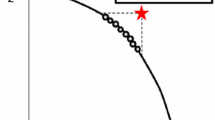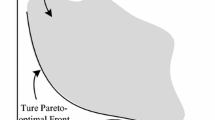Abstract
Eliciting the preferences of a decision maker is a crucial step when applying multi-criteria decision aid methods on real applications. Yet it remains an open research question, especially in the context of the promethee methods. In this paper, we propose a bi-objective optimization model to tackle the preference elicitation problem. Its main advantage over the widely spread linear programming methods (traditionally proposed to address this question) is the simultaneous optimization of (1) the number of inconsistencies and (2) the robustness of the parameter values. We experimentally study our method for inferring the promethee II preference parameters using the NSGA-II evolutionary multi-objective optimization algorithm. Results obtained on artificial datasets suggest that our method offers promising new perspectives in that field of research.
Access this chapter
Tax calculation will be finalised at checkout
Purchases are for personal use only
Preview
Unable to display preview. Download preview PDF.
Similar content being viewed by others
References
Bous, G., Fortemps, P., Glineur, F., Pirlot, M.: ACUTA: A novel method for eliciting additive value functions on the basis of holistic preference statements. European J. Oper. Res. 206(2), 435–444 (2010)
Brans, J.P., Mareschal, B.: PROMETHEE methods. In: [7], ch. 5, pp. 163–195
Dias, L., Mousseau, V., Figueira, J.R., Clímaco, J.: An aggregation/disaggregation approach to obtain robust conclusions with ELECTRE TRI. European J. Oper. Res. 138(2), 332–348 (2002)
Doumpos, M., Zopounidis, C.: Preference disaggregation and statistical learning for multicriteria decision support: A review. European J. Oper. Res. 209(3), 203–214 (2011)
Eppe, S., López-Ibáñez, M., Stützle, T., De Smet, Y.: An experimental study of preference model integration into multi-objective optimization heuristics. In: Proceedings of the 2011 Congress on Evolutionary Computation (CEC 2011), IEEE Press, Piscataway (2011)
Fernandez, E., Navarro, J., Bernal, S.: Multicriteria sorting using a valued indifference relation under a preference disaggregation paradigm. European J. Oper. Res. 198(2), 602–609 (2009)
Figueira, J.R., Greco, S., Ehrgott, M. (eds.): Multiple Criteria Decision Analysis, State of the Art Surveys. Springer, Heidelberg (2005)
Frikha, H., Chabchoub, H., Martel, J.M.: Inferring criteria’s relative importance coefficients in PROMETHEE II. IJOR Int. J. Oper. Res. 7(2), 257–275 (2010)
Greco, S., Kadzinski, M., Mousseau, V., Słowiński, R.: ELECTREGKMS: Robust ordinal regression for outranking methods. European J. Oper. Res. 214(1), 118–135 (2011)
Mousseau, V.: Elicitation des prfrences pour l’aide multicritre la dcision. Ph.D. thesis, Université Paris-Dauphine, Paris, France (2003)
Mousseau, V., Słowiński, R.: Inferring an ELECTRE TRI model from assignment examples. J. Global Optim. 12(2), 157–174 (1998)
Özerol, G., Karasakal, E.: Interactive outranking approaches for multicriteria decision-making problems with imprecise information. JORS 59, 1253–1268 (2007)
Öztürk, M., Tsoukiàs, A., Vincke, P.: Preference modelling. In: [7], ch. 2, pp. 27–72
Sun, Z., Han, M.: Multi-criteria decision making based on PROMETHEE method. In: Proceedings of the 2010 International Conference on Computing, Control and Industrial Engineering, pp. 416–418. IEEE Computer Society Press, Los Alamitos (2010)
Author information
Authors and Affiliations
Editor information
Editors and Affiliations
Rights and permissions
Copyright information
© 2011 Springer-Verlag Berlin Heidelberg
About this paper
Cite this paper
Eppe, S., De Smet, Y., Stützle, T. (2011). A Bi-objective Optimization Model to Eliciting Decision Maker’s Preferences for the PROMETHEE II Method. In: Brafman, R.I., Roberts, F.S., Tsoukiàs, A. (eds) Algorithmic Decision Theory. ADT 2011. Lecture Notes in Computer Science(), vol 6992. Springer, Berlin, Heidelberg. https://doi.org/10.1007/978-3-642-24873-3_5
Download citation
DOI: https://doi.org/10.1007/978-3-642-24873-3_5
Publisher Name: Springer, Berlin, Heidelberg
Print ISBN: 978-3-642-24872-6
Online ISBN: 978-3-642-24873-3
eBook Packages: Computer ScienceComputer Science (R0)




